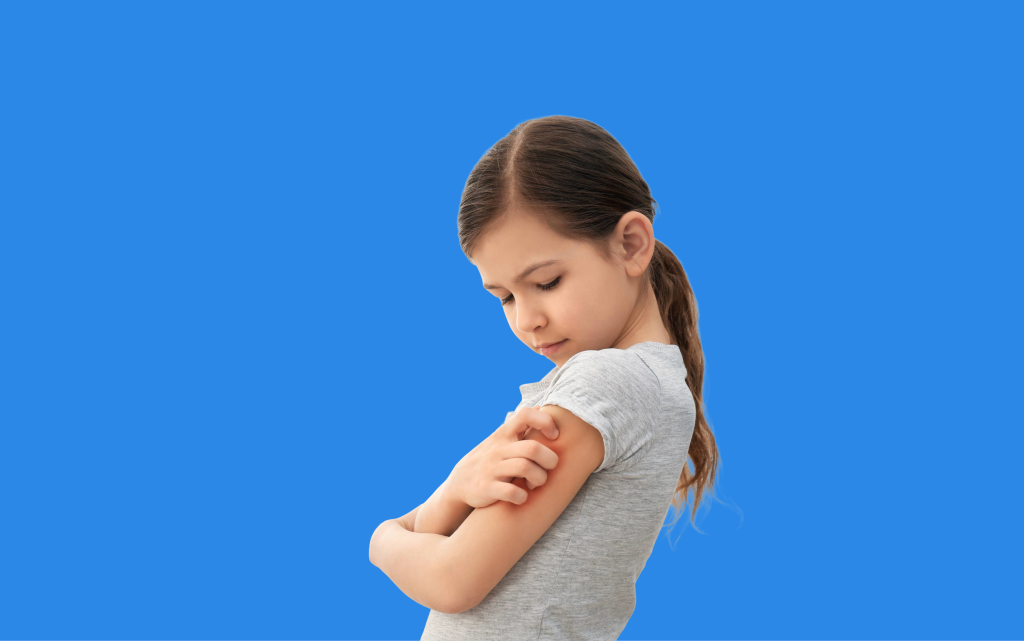See a provider online for same-day eczema treatment
$29 / message visit | $49 / video visit


What You Need to Do
Select Your Concern & Book
Choose your health concern (like hair loss or weight) and answer a few quick questions. Pick a time that works for you.
Meet Your Provider
Chat or video call with a licensed provider who will assess your condition and prescribe treatment if needed.
Get Your Treatment
Get care for common conditions—and if medication is needed, prescriptions can be sent directly to your pharmacy or delivered to your door (where available).
Get Ongoing Support
Stay connected with follow-up care to track progress and adjust your treatment if necessary.
What Causes Eczema?
Eczema, also known as atopic dermatitis, causes dry, itchy, and inflamed skin due to a weakened skin barrier. Normally, your skin locks in moisture and blocks irritants—but in people with eczema, this barrier doesn’t function properly.
The exact cause isn’t fully understood, but it may involve a mix of genetics, immune response, and environmental factors.

How Do You Treat Eczema Flare-Ups?
Eczema flare-ups are usually managed with:
Topical corticosteroids to reduce inflammation
Antihistamines (like Benadryl) to relieve itching
Regular moisturizing to repair the skin barrier
Preventing flare-ups is just as important. Avoiding common triggers like fragranced soaps, harsh detergents, wool fabrics, and extreme temperatures can help keep your skin calm and hydrated over time.
Is Pay-per-Virtual visit right for you?
-
You are 18–64 years old or your child is 2–11 years old
-
You (or your child) have a prior diagnosis of eczema (atopic dermatitis)
-
There is no oozing, bleeding, or signs of skin infection (like fever, increased pain, redness, or swelling)
-
Eczema symptoms are not affecting the eyelids or skin around the eyes
Common Medications for eczema
Your iVisitDoc provider will assess your or your child’s symptoms and medical history to determine if a prescription treatment is appropriate. If prescribed, medication can be sent to any pharmacy you choose. Costs may be covered by insurance, depending on your plan.
Please note:
Oral steroids, injectables, and immunotherapy are not available through iVisitDoc virtual visits
Topical calcineurin inhibitors are not prescribed for children via telehealth
Topical corticosteroids
Steroid creams and ointments help reduce inflammation by supporting the skin’s natural defenses. They come in different strengths, from Class VII (least potent) to Class I (most potent).
Commonly prescribed options include:
• Hydrocortisone
• Desonide
• Fluocinolone
• Triamcinolone acetonide
• Fluocinonide
• Mometasone
• Betamethasone
• Clobetasol propionate
• Halobetasol
Lotions/emollients
Over-the-counter (OTC) moisturizers play a key role in eczema care by helping protect and repair the skin barrier. Look for formulas that are fragrance-free, gentle, and rich in oils to lock in moisture.
Common OTC options include:
• Aquaphor
• Aveeno
• CeraVe
• Cetaphil
• Eucerin
• Gold Bond
• Lubriderm
• Vaseline
Oral Antihistamines
Over-the-counter antihistamines can help ease itchiness caused by eczema, especially at night when symptoms may worsen.
Common options include:
• Diphenhydramine (Benadryl)
• Fexofenadine (Allegra)
• Loratadine (Claritin)
Pro Tip
Start with lifestyle adjustments—like avoiding trigger foods, elevating your head while sleeping, and eating smaller meals. Medications work best when paired with healthy habits.
Quick virtual visits, anytime
Your questions answered
iVisitDoc Care & Access
What are your telehealth options for eczema treatment?
You can meet virtually with a licensed iVisitDoc provider to discuss eczema symptoms, such as dry, itchy, or inflamed skin. Your provider may recommend topical steroid creams, OTC antihistamines, or moisturizers, and guide you on long-term flare-up prevention.
Can I use my health insurance for iVisitDoc visits?
Yes, many insurance plans cover iVisitDoc telehealth visits. If insurance isn’t used, a simple pay-per-visit option is also available.
What happens if my provider can’t diagnose or treat my symptoms virtually?
If your eczema symptoms show signs of infection, open sores, or severe complications, your provider may recommend in-person care and help guide your next steps.
Can I follow up with my provider after the visit?
Yes. You’ll be able to message your provider securely after your visit to ask questions or clarify your treatment plan.
Can I refill my eczema prescription through iVisitDoc?
If your condition is stable and treatment is still appropriate, your provider can approve a prescription refill or renewal based on your medical history and symptoms.
How does iVisitDoc protect my health information?
All appointments and data are secured using HIPAA-compliant, encrypted technology to ensure your health information remains private and protected.
About Childhood Eczema
What kind of telehealth visits can my child have through iVisitDoc?
iVisitDoc offers telehealth visits for children ages 2 to 11 for a range of non-emergency concerns, including eczema, rashes, allergies, cold symptoms, and mild skin infections. Providers can evaluate symptoms, recommend treatments, and prescribe medication when appropriate.
Do I need to be the parent or legal guardian?
Yes. A parent or legal guardian must be present during the visit and provide consent for the child to receive care.
Who will treat my child through iVisitDoc?
Your child will be seen by a licensed pediatrician, family nurse practitioner, or physician assistant who has experience in pediatric telemedicine and skin-related conditions like eczema.
Can I get a doctor’s note for my child?
Yes. If appropriate, your provider can issue a school, daycare, or activity note after evaluating your child’s condition.
Does childhood eczema go away?
Eczema can improve or even resolve as children get older, especially with consistent care and trigger avoidance. However, some kids may continue to experience symptoms into adolescence or adulthood.
How is childhood eczema diagnosed?
Eczema is usually diagnosed based on your child’s symptoms and medical history. Providers look for dry, itchy patches, especially behind the knees, on the arms, or cheeks. No lab tests are typically needed for diagnosis.
What causes eczema in children?
The root cause is a weakened skin barrier, which makes the skin more prone to dryness, irritation, and inflammation. Genetics, allergies, and environmental triggers (like cold air, soaps, or fabrics) can all contribute.
About Childhood Eczema
What are the best skin care habits for eczema?
To help prevent flare-ups and protect your skin barrier, follow these eczema-friendly habits:
Use a gentle, fragrance-free cleanser
Take short, lukewarm showers instead of hot baths
Moisturize daily—especially after bathing
Avoid harsh soaps, detergents, or scratchy fabrics (like wool)
Use a humidifier in dry weather
Try to avoid known triggers like allergens or extreme temperatures
What is the 3-minute rule for eczema?
The “3-minute rule” means applying moisturizer within 3 minutes after bathing—while your skin is still damp. This helps seal in moisture and prevent dryness or irritation. It’s one of the most effective daily steps for managing eczema.
Are people with eczema more likely to develop other atopic conditions?
Yes. Eczema is often linked to other atopic (allergic) conditions such as:
Asthma
Hay fever (allergic rhinitis)
Food allergies
This is known as the “atopic triad”, and many people with eczema may experience more than one of these conditions.
Clinical Sources
American Academy of Dermatology (AAD)
National Eczema Association (NEA)
Mayo Clinic
National Institutes of Health (NIH)
Cleveland Clinic
